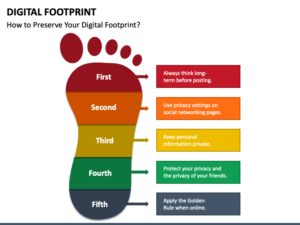Teaching digital footprint, who is responsible?
With the advancement of social media and online technology, lots of people share their personal and work experience through these platforms. Educators and parents are not exceptions and they share the students’ and children’s improvements or talents with the others. However, some disagree with this action and regard it as kind of digital footprint for children before they reach their legal ages. This is relevant to the topic we discussed about in one of our challenging topics in EC&I 830. “Do educators and schools have a responsibility to help their students develop a digital footprint?” The summary of our debate is presented in this post.
Here there is a clip of some kids’ ideas about the results of their digital footprints.
Digital footprint includes several issues that can clarify a person’s identity which is effective in his/her future personal and professional .So they should be taught to keep someone’s digital footprint safe. Educators and schools can maneuver on these digital skills to lead to a more responsible, thoughtful and secure society in future.

There are two ways that digital footprint happens ( as Rahima and Jessica mentioned): active and passive one. What parents do about sharing their kids’ experience online can be regarded as a passive one while the academic teaching of digital literacy is regarded as an active one.
The pros of this debate assume that online sharing of parents and educators helps students build a positive online identity. Keegan Korf (2017) as an educator also mentions that “entering education means that all eyes are you and you have to model digital citizenship for your students”. She shares her online personal experience, tackles and worries as a kid dealing with exploring her independence in an online space. That is why the important role of educators as online role models lie.
Moreover, by educators involvement in digital world, children can “understand the implications, consequences and best practices for engaging with technology and social media is critical to safeguarding their well-being and to developing workplace skills” according to Dotterer(2016)
On the other hand, others argue that schools and educators are too busy to take the responsibility of educating children about their digital footprint. They may also discuss that they are not well-educated or equipped in online affairs. However, just like other necessary subjects at school, this resent topic can be allocated appropriate energy, budget and planning to minimize the unwanted and devastating effects of children’s digital foot print.
Finally, though everyone is responsible for his/her decisions and actions, the role and effect of a person’s surrounding people such as educators cannot be ignored. As they can be a main and impartial reference for education.
Do you remember the best life-long thing you learned from any of your educators?

Hey Hanieh
I really enjoyed the 5 steps for the development of digital foot print! I am in agreement with the fact that the impact of the surrounding can not be ignored and has to be a meaningful for all around